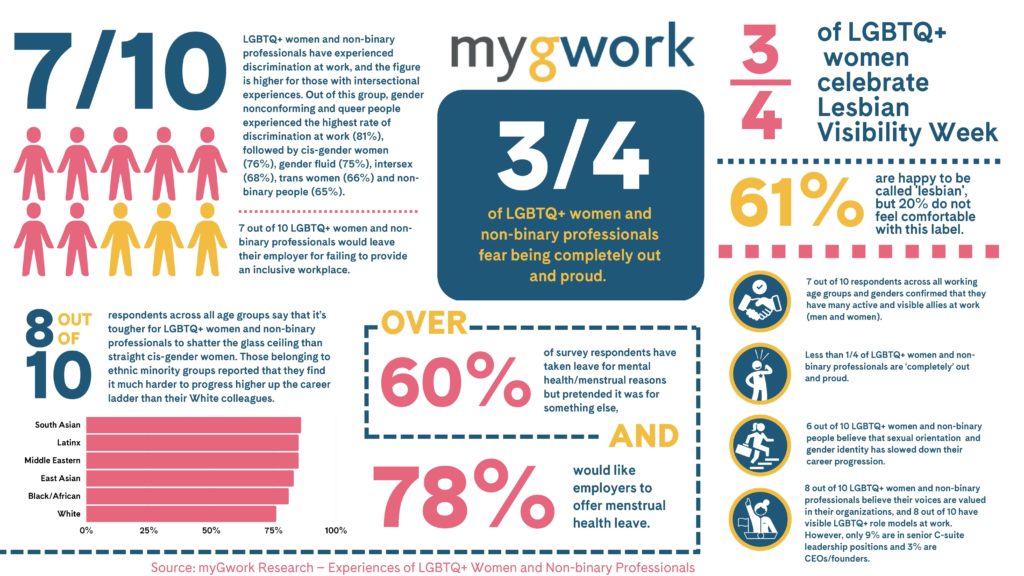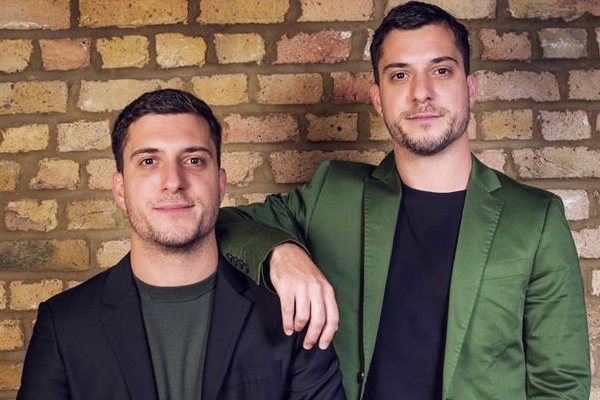High rates of discrimination are preventing LGBTQ+ women and non-binary professionals from coming out at work and in society at large, according to the latest research from myGwork, to mark Lesbian Visibility Week.
In fact, three-quarters of LGBTQ+ women and non-binary professionals are reluctant to fully come out mainly because of continuing high discrimination rates, revealed the study carried out by the global LGBTQ+ business platform, which highlights the experiences of over 2,000 LGBTQ+ women and non-binary professionals from around the world.
The study confirms that seven out of 10 continue to experience discrimination at work, and the figure is much higher for people of colour, and those from more marginalised communities. For example, gender nonconforming and gender queer people experienced the highest rate of discrimination at work, followed by cisgender women (76%), gender fluid (75%), intersex (68%), trans women (66%) and non-binary people (65%).
IMPACT OF INTERSECTIONAL EXPERIENCES
Additionally, many LGBTQ+ women and non-binary professionals believe that their sexual orientation and/or gender identity has hindered career progression, and also influences whether they are offered training and development opportunities to get ahead. In fact, eight out of 10 (79%), across all age groups said that it’s tougher for LGBTQ+ women and non-binary people to shatter the glass ceiling than straight cisgender women. Again, the figure is much higher for those with intersectional experiences who belong to other marginalised communities.
Those belonging to ethnic minority groups reported that they find it much harder to progress higher up the career ladder than their White colleagues. For example, those with Latinx (86%), South Asian (85%) and Middle Eastern (85%) backgrounds found it the most difficult, followed by East Asian (83%) and Black/African communities (81%), compared to their White colleagues (76%). This is despite reported high rates of allyship from both men and cis-gender straight women, as well as more visible LGBTQ+ role models at work.

LGBTQ+ WOMEN LEADERS
According to the report, seven out of 10 respondents said they had visible and active allies (men and women), at work. Nevertheless, LGBTQ+ women and non-binary professionals who are visibly out and proud leaders in top roles are still scarce. The research confirmed that very few LGBTQ+ women and non-binary professionals occupy top C-suite leadership roles. Just 9% hold leadership roles, and only 3% are CEOs/founders.
“We carried out this research to delve into some of the specific challenges LGBTQ+ women and non-binary professionals face at work,” shared the Co-founders of myGwork, Adrien and Pierre Gaubert. “Our findings confirm that lesbians are statistically less likely than their gay male colleagues to be out at work, face much higher rates of discrimination and are not getting the adequate support they need from management and HR to progress, despite corporate efforts to make workplaces more inclusive, which ultimately boils down to lack of LGBTQ+-education and training.”

AUTHENTIC SUPPORT & ALLYSHIP
The fact that there are an increasing number of allies and LGBTQ+ role models, helping to inspire the younger generations in the community, “clearly demonstrates that many companies are moving in the right direction”, added the Gaubert brothers. “However, employers need to step up and work much harder to create truly inclusive workplaces capable of stamping out discrimination and bias through things such as authentic support and allyship from the C-suite, as well as investment in better LGBTQ+ education, so that leaders and managers are adequately equipped to deal with discrimination, as well as retain this valuable talent pool.”
The research provides timely advice on what steps organisations can take to make the workplace more inclusive and stamp out discrimination, so LGBTQ+ women and non-binary people feel safe enough to come out, stay out and work with pride. It also uncovers tips on how to attract and retain this highly talented group, particularly given the fact that over five in 10 LGBTQ+ women and non-binary professionals are currently job hunting. Diversity, equity, and inclusion is also highly important to this group, as seven out of 10 said they have left an employer for failing to provide an inclusive and equitable workplace.
LESBIAN VISIBILITY WEEK
Linda Riley, Founder of Lesbian Visibility Week and Publisher of DIVA magazine, described myGwork’s research as “incredibly valuable” because it highlights the reality of being an LGBTQ+ woman or non-binary person in the workplace. “It shows that while progress has been made, there is still a long way to go before everyone in our community can feel safe to be their authentic selves at work. It is so important to have this kind of study focusing on our specific, and all too often overlooked, experiences,” shared Riley.
”Lesbian representation matters because it’s not just about visibility,” highlighted Michelle “Michi” Raymond, Business Development Director at myGwork. “To create a workplace that is truly inclusive and supportive, businesses need to actively listen to and learn from their employees. By embracing diversity and championing inclusivity, we can create a work environment that not only accepts but celebrates all identities.”
ROLE OF ALLYSHIP
Juanita Gomez, Organon’s Associate Director of Customer Service Management, agreed: “Employers can create an inclusive workplace by allowing individuals to be their authentic selves and welcoming the differences in who their employees are. For me, it is important to ‘belong’ because then I am a contributor to the business regardless of how I identify. Belonging is part of the fabric of the business, including is by invitation or making accommodations for comfort. Have the conversations, teach others about the differences in who people are, and be frank about expectations and boundaries.”
Allies play a vital role in creating a safe place at work for LGBTQ+ women to come out and stay out, noted Marie-Helene Tyack, Global Diversity & Inclusion Business Partner, Allianz Global Corporate & Speciality. “To be out, we need to feel safe, and allies have a big part to play in us having that psychological safety needed to feel vulnerable and to be our true selves. Collectively lesbians have a big voice, but it can and should be amplified with the help of our allies,” concluded Tyack.
Check out the full report below.








































